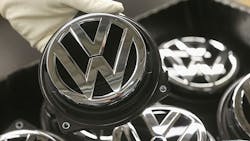VW Reaches Deal for Emissions-Cheating Audi, Porsche Models
Volkswagen AG reached an agreement with U.S. car owners and regulators to fix or buy back about 80,000 Audi, VW and Porsche vehicles with emissions-cheating 3.0-liter diesel engines.
The accord covering the 2014 Volkswagen Toureg, some 2015 Porsche model and some 2016 Audi models resolves another significant piece of Volkswagen’s emissions-cheating scandal.
The company admitted last year that about 11 million diesel cars worldwide were outfitted with a so-called defeat device to game U.S. environmental tests.
Details of the agreement, including its cost to the German carmaker, weren’t disclosed during a brief hearing on December 20 in San Francisco federal court.
The accord provides for repairing the cars if a fix is approved by the government, and like an earlier deal covering 2-liter engines, includes an offer to buy back at least some vehicles. The agreement also covers claims against VW supplier Robert Bosch Gmbh.
VW called the deal “another important step forward in our efforts to make things right for our customers.”
‘Earning Back’
“We are committed to earning back the trust of all our stakeholders and thank our customers and dealers for their patience as the process moves forward,” the company said in a statement.
U.S. District Judge Charles Breyer gave his final approval in October to the carmaker’s settlement covering 480,000 Volkswagens with 2.0-liter engines.
The agreement came after Breyer offered parties four extensions in December to reach a deal, including two on Dec. 16 during, what he called, “intense discussions." He gave lawyers for VW, car owners and the government the weekend to conclude negotiations before returning to court Monday in San Francisco, when parties were granted a “final continuance” to resolve “a complicated settlement” Breyer said.
The carmaker’s agreement with the Environmental Protection Agency and California’s Air Resources Board calls for VW to fix 60,000 3-liter vehicles and buy back about 19,000 older models that would be too complex to repair, people familiar with the matter have said. The recall plans involve a simple software update, and avoiding a full buyback of all the cars would save the company about $4 billion, the people said.
By Kartikay Mehrotra and Margaret Cronin Fisk
About the Author
Bloomberg
Licensed content from Bloomberg, copyright 2016.
